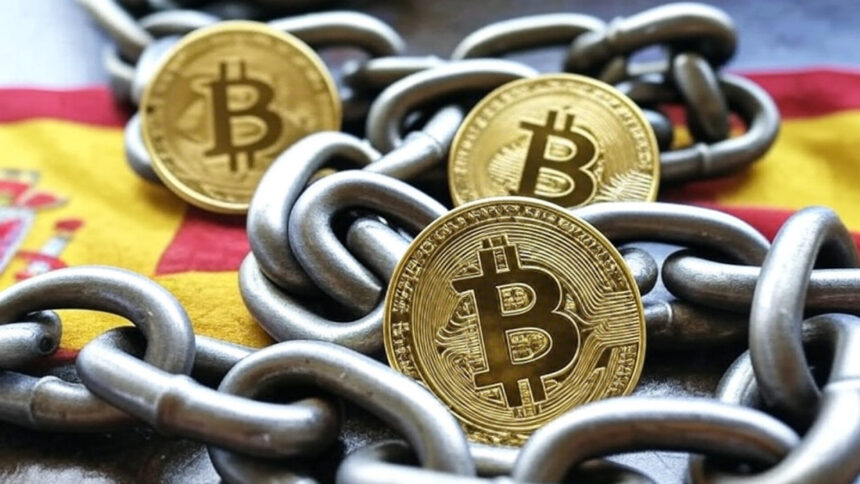Recently, the Spanish government has presented a normative proposal to establish new obligations for cryptographic service providers (VASPs). Under this draft, the exchange will need to report user balances and transactions to the tax authority, and even the authorities can seize cryptocurrency to resolve tax obligations.
The initiative, alongside the DAC8 European Directive, marks a turning point in the way crypto ecosystems are regulated in Spain. This text analyzes key points of proposals, the mistakes rookies usually make, their impact on users and businesses, and how they can leverage the moment in their standards.
Proposed regulations: Data, reports, and the power of seizures
One of the most controversial ideas of the project is Exchanges must share details with the user’s Ministry of Finance: Balance, movement, related accounts, and even exchange accounts outside of Spain. Furthermore, the regulations believe that tax agencies can seize cryptoactives to meet their tax obligations.
What many beginners haven’t seen is that this is not an automatic expropriation. There must be legal proceedings and tax justifications. However, the central point is that projects will allow digital assets to be subject to forced execution just like bank accounts.
The least experienced habitual mistake is to assume that cryptocurrencies are “untouched” by the authorities. The idea no longer blocks the new regulatory panorama.
Technical Diagnosis: How the reporting mechanism works
For tax agencies to receive exchanged data, the system requires VASP to adopt secure reporting protocols, compatibility with DAC8 standards, and an automated auditing mechanism.
Here are the technical points they need to deal with:
- Translation of crypto transactions into euro equivalents for financial purposes.
- Check the robust KYC/AML integrated user ID.
- Encrypting sensitive data during reports.
- Ability to respond to cross-border demands in European contexts.
These are not small details. Design failures here can expose sensitive data Or generate obstacles to fiscal adjustments.
Financial System and Economic Benefits
From a macro perspective, the regulations help reduce tax evasion related to crypto, providing additional revenue for the state. It is estimated that transparency could mobilize billions with current assets.
On top of that, Regulations give users and operators legitimate peacecan encourage domestic and foreign investment in cryptographic technology, custody, auditing, and fintech. That legal certainty is a positive signal for businesses who want to operate in Spain but fear a normative gap.
For users, the obligation to report can create discomfort, but it also ensures that the ecosystem is more legal and attractive. A transparent market attracts more volumes, reduces the risk of exchange reputation, and ensures larger adoption of products such as staking and poker in Bitcoin.
Risks and Criticisms that Must Consider
There is no criticism of this measure. Some warn that state interference can threaten users who value privacy. Others fear they can filter sensitive data that is not controlled. Others also point out that reporting loads can increase the operating costs of medium replacements.
That’s the common mistakes seen among rookies Do not dimension the regulatory costs. Compliance with DAC8 reports may require millions of infrastructure for auditing and technical adaptation. Small operators could be expelled, and the market was left in the hands of great actors.
It is also essential to distinguish between preventive attacks (asset blocks) and critical execution (transfer). The law must guarantee defense rights, deadlines and judicial processes.
Comparison with the international model
Several countries have adopted similar frames. In the European Union, DAC8 requires VASPs to report cryptographically active transactions to combat crosstax fraud. Spain is trying to meet that standard.
Furthermore, research into chained systems shows that the traceable nature of blockchains allows authorities to identify and freeze funds related to financial crimes more effectively than traditional systems.
Comparison teaches lessons. Proactive regulations without technical control can create security risks; Doing that well will help you make the country a responsible cryptocurrency referral.
Strategic Tips for Users and Operators
The first thing is to maintain a clear book and register each cryptographic operation on the date. Time is equivalent in context with the Euro. Because that discipline promotes financial reconciliation and avoids future headaches. Also We recommend choosing a compliant replacementAdd additional security levels on platforms that meet DAC8 reports and are already prepared to receive external audits.
Another important aspect is the separation of funds, which helps to accurately separate legal liability by maintaining separate wallets for high-funded activities. On the operator’s side, the key is to update the infrastructure, adapt the APIs and internal systems so that automatic and insurance reports can be issued without relying on manual processes that are constantly failing.
Finally, There is no need to ignore the importance of preparing a robust legal defense.Having a competent legal team ensures that the seizure attempt is carried out in respect of the user’s rights. These recommendations are not magical, but many years of sophisticated practices have observed both failures and victory within the industry.
Conclusion: Regulations before and after
This bill is not a simple fiscal adjustment. You can redefine the rules of the Spanish crypto ecosystem game. If approved, exchanges will operate with greater transparency and in the case of fiscal debt, the state will act on digital assets.
The key is to implement this framework without destroying innovation. It will be advantageous for operators who adopt early compliance and safety standards. Those who understand taxes and technical liability are better positioned.
Codes are not unlawful territory. The myth is already declining. What’s coming is regulation, transparency and opportunity. And if that goes well, Spain can become a European reference for responsible, solid cryptographic actions.
The content and links provided in this article only serve a useful purpose. Cryptonotics does not provide legal, financial, or investment recommendations or councils. Investing in cryptocurrency in advance with ICOs and tokens is risky. Each stakeholder must carry out his or her research and invest at her own risk. Cryptonotics does not support investment offers or anything advertised here. For more information, see Achieve Our Responsibility.
(tagstotranslate)Exchange Houses (Exchange)


